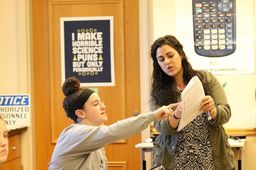
January 28, 2019
By Kim Harris Thacker

Until the final week of her undergraduate studies in biochemistry, Melissa Bernardo planned to be a medical doctor; but when she traveled to Costa Rica to complete a research project that was part of her tropical ecology class, her career plans changed.
“I fell in love with research in Costa Rica,” Bernardo says. “I knew I had to go back to school, study biology and become a teacher.”
During her Ph.D. at Wesleyan University, she had the opportunity to study and write her dissertation on parasite-manipulated host feeding behavior and its applications. She also taught classes, ran labs and gave guest lectures at Wesleyan.
“I taught with lots of different professors and saw lots of teaching styles,” she says. “But it wasn’t until partway through 2017 — my first year at Walker’s — that I realized I wanted to use a project-based curriculum in my own classroom.”
Bernardo had incorporated student projects into some units in her classes and had consistently witnessed how these units ended up being the ones that students performed best on in their midterms and finals. She knew that if she were to create an entire curriculum in which projects played a major role, she would also create additional opportunities for her students to succeed.
“It’s like how when you smell something, it can bring back a specific memory. Projects do the same thing for students,” Bernardo says. “They think back to a project they did, and they recall the information they were learning at the time.”
Alexis Berard, a senior from Farmington says, “It’s good to sit and listen to a teacher lecture, but to actually do a project — to see it and feel it and watch it come to life — I think that’s super valuable. It helps me to understand the material more fully.”
Gloria Ziting, a senior from Beijing, agrees. “It’s hard for me to focus if I’m just reading something. But if I’m doing something with my hands, it’s better. In the class I took with Dr. Bernardo, we did labs and projects and presentations. We even rapped about dung beetles. Class was never boring.”
“The way Dr. Bernardo teaches helps me so much,” says Madison Parham-Murray, a senior from New York City. “Science has always been kind of hard for me, but in Dr. Bernardo’s class, I’m more relaxed and eager to learn. She’s so passionate about what she teaches.”
Bernardo enjoys teaching tropical ecology, in particular. As part of a tropical ecology class project, her students built a rainforest in the Ferguson Theatre lobby.
“We didn’t have a lot of time to make the project,” says Ziting, who was in the class, “but we were dedicated to it, and we finished it just with our passion.”
Another of Bernardo’s favorite classroom projects is her Imaginary Symbiosis Project, which is part of her biology course.
“I give the students a list of imaginary creatures and have them create a symbiotic relationship between two of them,” she says. “The students bring their creatures to life visually, and then they give a presentation where they field questions from me and address what they’ve learned in the unit.”
This style of classroom instruction aligns with Bernardo’s teaching philosophy, which is that her students be able to teach her what they’ve learned.
“She always holds us to a high standard,” Berard says, “but she’s also right there, beside us, helping us to push on.”
It’s a relationship that, in terms Dr. Bernardo might use, is beneficial to all parties involved.